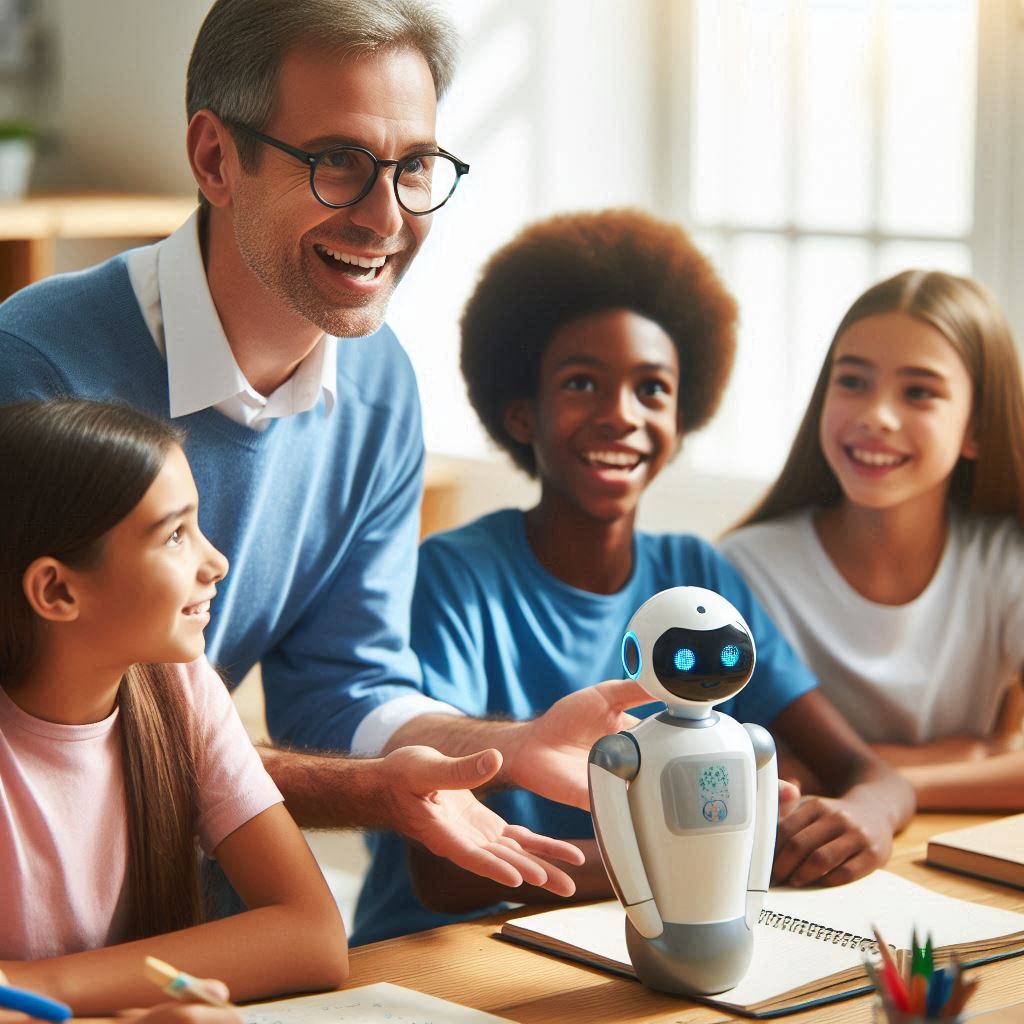“AI chatbots are reshaping the way we learn, making education more accessible, interactive, and tailored to individual needs.”
AI Chatbots as Virtual Teaching Assistants in Online Courses
The rise of online education has transformed traditional learning, breaking the confines of brick-and-mortar classrooms.
But as online courses gain popularity, challenges like student engagement, timely feedback, and personalized learning persist.
Enter AI chatbots: virtual teaching assistants that are revolutionizing online education.
Imagine having a 24/7 assistant that answers your questions, provides instant feedback, and adapts to your learning style. Sounds futuristic? It’s happening right now.
AI chatbots, powered by advanced natural language processing (NLP) and machine learning algorithms, can interact with students in real-time.
These bots are designed to simulate human-like conversations, making them perfect for assisting students in online courses.
From answering queries to grading assignments, these chatbots can lighten the workload for educators and enhance the learning experience for students.
For instance, universities like Georgia Tech have implemented AI teaching assistants in their online programs, providing faster and more consistent support to students.
The applications of AI chatbots in education are diverse and growing.
They can act as tutors, guiding students through complex concepts, or as administrative assistants, handling routine queries like course schedules and deadlines.
This flexibility makes them a valuable asset in today’s education landscape, especially as the demand for online learning continues to rise.
In this article, we’ll dive deep into the technology behind AI chatbots, their applications in online courses, the benefits they bring to the table, their limitations, and their future potential.
By the end, you’ll have a comprehensive understanding of how these digital assistants are shaping the future of education.
The Technology Behind AI Chatbots
At the core of AI chatbots are sophisticated algorithms designed to understand and respond to human language.
The backbone of these systems is natural language processing (NLP), a branch of AI that enables machines to interpret, generate, and engage in human-like conversations.
How NLP Works
NLP combines computational linguistics with machine learning to:
- Analyze syntax and semantics.
- Recognize context and sentiment.
- Generate coherent and context-aware responses.
Chatbots also use machine learning to improve over time. For instance, as students ask questions, the chatbot learns common queries and adapts its responses.
This capability ensures that bots become more efficient the more they are used.
Another essential component is conversational AI, which allows chatbots to engage in multi-turn dialogues.
Unlike simple bots that provide predefined answers, advanced systems like GPT (Generative Pre-trained Transformers) offer dynamic, context-sensitive replies.
This makes them suitable for complex discussions, such as explaining mathematical concepts or debating philosophical ideas.
Integrating AI Chatbots into Online Courses
Integrating AI chatbots into learning management systems (LMS) is a game-changer. These bots can:
- Provide instant answers to frequently asked questions.
- Help students navigate course content.
- Offer personalized learning paths based on individual performance.
For example, an AI chatbot integrated with a math course can identify areas where a student struggles and recommend additional resources or exercises.
This level of personalization is challenging for human instructors to achieve, especially in large-scale online courses.
Applications of AI Chatbots in Online Education
AI chatbots are versatile tools that cater to various aspects of online learning. Let’s explore some key applications.
1. Student Support
One of the most common uses of AI chatbots is in providing round-the-clock student support.
Bots can answer questions about course materials, deadlines, and technical issues, ensuring students get the help they need without waiting for human intervention.
2. Personalized Learning
AI chatbots can analyze a student’s performance and provide tailored recommendations. For instance:
- Suggesting additional reading for weak areas.
- Offering quizzes to reinforce learning.
- Adjusting the difficulty level of assignments.
3. Administrative Assistance
Managing administrative tasks can be time-consuming for educators. AI chatbots can:
- Send reminders about deadlines.
- Handle enrollment queries.
- Provide course updates.
4. Real-Time Feedback
AI chatbots can instantly grade assignments and quizzes, providing immediate feedback. This helps students understand their mistakes and improve faster.
Real-World Example
Duolingo, a popular language-learning app, uses AI chatbots to simulate conversations in different languages. This feature helps users practice in real-time, making learning more interactive and engaging.
Read: https://abiodunapoeso.com/educational-system-in-africa/

Benefits of AI Chatbots in Online Courses
The integration of AI chatbots in online education offers numerous advantages for both students and educators.
1. Accessibility
Chatbots provide 24/7 support, making education more accessible to students in different time zones or with irregular schedules.
2. Scalability
Instructors can manage larger classes without compromising on the quality of support, as chatbots handle repetitive tasks efficiently.
3. Engagement
Interactive features like quizzes, games, and real-time feedback keep students engaged, reducing dropout rates in online courses.
4. Cost-Effectiveness
By automating administrative and support tasks, institutions can reduce operational costs while maintaining high-quality education.
Statistics Highlighting Benefits
- According to a 2023 study, courses using AI chatbots reported a 25% increase in student engagement.
- Institutions that adopted chatbots saved an average of 30% on administrative costs.
Read: https://abiodunapoeso.com/educational-technology-integration/
Limitations of AI Chatbots
While AI chatbots bring numerous benefits, they are not without limitations.
1. Lack of Human Emotion
Chatbots can struggle with understanding emotional nuances, which can make them less effective in offering emotional support.
2. Dependence on Data
AI systems require large datasets to function effectively. Poor-quality data can lead to inaccurate or irrelevant responses.
3. Technical Challenges
Issues like language barriers, technical glitches, and inability to handle complex queries can hinder their performance.
4. Privacy Concerns
Using AI chatbots involves collecting student data, which raises concerns about privacy and data security.
Example of Limitations
In one instance, a university chatbot misinterpreted a question about financial aid, providing irrelevant information. Such errors can frustrate users.
Read: https://abiodunapoeso.com/school-psychologists-in-education/
The Future of AI Chatbots in Online Education
The potential of AI chatbots in education is vast and ever-growing. Here’s what the future might hold:
1. Enhanced Personalization
Future chatbots will leverage advanced AI to deliver hyper-personalized learning experiences, adapting to each student’s unique needs and preferences.
2. Multilingual Support
With improved NLP, chatbots will offer seamless support in multiple languages, making education truly global.
3. Integration with Emerging Technologies
AI chatbots will integrate with virtual reality (VR) and augmented reality (AR) to create immersive learning experiences.
4. Improved Emotional Intelligence
Future chatbots might incorporate emotional AI, enabling them to understand and respond to students’ emotional states.
5. Ethical AI
As concerns about privacy and bias grow, developers will focus on creating transparent, ethical AI systems.
Read: https://abiodunapoeso.com/educational-management/
Conclusion
AI chatbots are transforming online education, offering personalized, accessible, and scalable solutions.
While challenges exist, their potential to revolutionize learning is undeniable.
By embracing these digital assistants, educators can enhance the quality of education and create a more engaging learning environment.











5 Comments
https://techosols.com
Best Cat Food Brands in Pakistan:
https://cheowpeow.com
Wet Cat Food
https://cheowpeow.com/products/beef-chunks-in-gravy
https://cheowpeow.com/products/beef-creamy-delight
Cat Food in Lahore
https://cheowpeow.com/products/chicken-chunks-in-gravy
https://cheowpeow.com/products/chicken-creamy-delight
Cat Food Brands in Pakistan
https://cheowpeow.com/products/fish-chunks-in-gravy
https://cheowpeow.com/products/fish-creamy-delight
Restaurants in Lahore
https://zouqesaeed.pk
Food Canning in Lahore
https://foodcanning.foodtogo.pk
Ten Ten Nail Colors:
https://tentennailcolor.com
Organic Plants in Lahore
https://organicplantfarm.pk
organic plants buy online
https://organicplantfarm.pk/product/leaf-beet-bright-yellow-chard/
https://organicplantfarm.pk/product/horn-pepper/
https://organicplantfarm.pk/product/hot-pepper-demon-red/
https://organicplantfarm.pk/product/thai-bird-chili/
Ten Ten nude colors
Nude Color Nail Polish
Mehroon Nail Polish
https://tentennailcolor.com/collections/glossy
Ten Ten Nail Polish
https://tentennailcolor.com/collections/shimmery-pearl
Tenten
https://tentennailcolor.com/collections/matte
Keune Sulphate free
https://www.keunepakistan.com
Keune Tinta Colors
https://www.keunepakistan.com/collections/tinta
Keune Hair Care
https://www.keunepakistan.com/collections/care
Driving school in UK – Watford – IQ Driving School
https://www.iqdrivingschool.co.uk/
Watford driving lessons – IQ Driving School
https://www.iqdrivingschool.co.uk/packages
Sivanna Colors
https://sivanna.com.pk
Ready to Cook
readytocook.foodtogo.pk
STD Cosmetics
stdcosmetics.com
Sivanna Cosmetics – Sivanna Colors
sivanna.com.pk
Neva Hair Colors
https://www.nevapakistan.com
https://www.nevapakistan.com/collections/hair-colour-products
https://www.nevapakistan.com/collections/neva-natural-colour
https://www.nevapakistan.com/collections/botanic-colour
Neva Men Hair Dye
https://www.nevapakistan.com/collections/neva-men
uld3hd
rs030f
Thanks for sharing. I read many of your blog posts, cool, your blog is very good. https://www.binance.com/ru/register?ref=V3MG69RO
“You get some of me but not tomorrow as they want me in as soon as I can make it happen. This is the one time when they say jump and I ask how high due the financial gains the company could benefit from and it being important enough for the client to appear in person.”
“Well I get an extra night of you at least! I wonder what we could do with that? Meantime, what about food? I am starving and delicious as it was a second breakfast is not quite enough to replenish me!”
“Well get something on and we’ll sort that out first.”
We drove into town and decided that a daytime visit to Charlie’s was going to be the answer. I parked in the bar lot and Elise dashed in to change into something more appropriate, jeans and a t-shirt along with her biker jacket but keeping her Converses on.
Walking down to the restaurant was different from the middle of the night visits as the streets were bustling and all of the shops and outlets were open.
Reaching Charlie’s we entered the front door and sat in a booth near the window. A beautiful young American Chinese girl came,smiled and said hello to Elise and gave us menus and asked if we wanted drinks in the meantime.
“No thanks Lin just a pot of Jasmine tea for us please.” Lin went back to the kitchen area. “No booze for me today as I will have to work in the bar so it is just tea for me.”
Not in a drinking mood either, I agreed with her.”
https://cannabis.net/user/155227
https://bashkir4919751952.diary.ru/
https://imageevent.com/alexhandr1950
https://tubeteencam.com/user/ellamina1954/profile
https://www.obesityhelp.com/members/bloodsift1954/about_me/